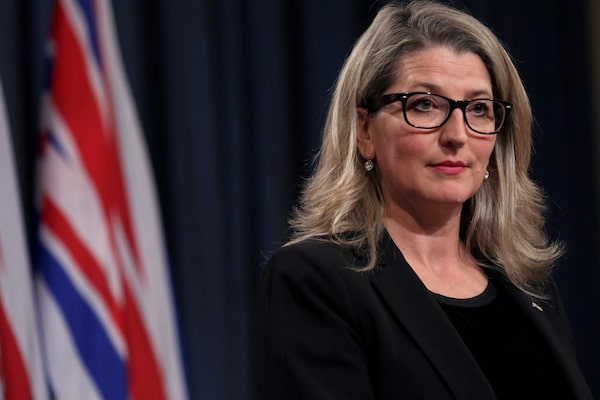
Agriculture Minister Lana Popham has introduced two pieces of farmland legislation aimed at reshaping the Agricultural Land Reserve.CHAD HIPOLITO
British Columbia’s government is ushering in changes this year aimed at maintaining protected farmland, but opposition MLAs say the measures are leading to unintended consequences for farmers, families and communities.
Agriculture Minister Lana Popham has introduced two pieces of farmland legislation aimed at reshaping the Agricultural Land Reserve. One that was tabled in the spring would partly roll back changes introduced by the former Liberal government, and another passed in 2018 targets the proliferation of “mega-mansions” on farmland.
This week, the Liberals have highlighted examples of farmers who say they are being stifled by new rules that restrict non-farm uses, such as housing for extended family.
Even a non-profit agency that feeds the hungry has struggled with the regulations. Since 2001, volunteers with the Fraser Valley Gleaners have processed vegetables that would normally be discarded to the landfill by grocery stores, creating dried soup mix for humanitarian efforts overseas. But the independent commission tasked with protecting the province’s Agricultural Land Reserve turned down an expansion request this summer.
Liberal MLA Mike de Jong, who represents the riding where the non-profit agency operates, said Tuesday the commission is being driven by a political shift led by the NDP government.
“They are acting in an uncompromising, ideological way,” he said in an interview. “The pendulum has swung in an extreme direction.”
In the case of the Gleaners, which Mr. de Jong raised in the House on Tuesday, the operation sought to expand the lunchroom for their volunteers, but the commission refused to grant the expansion because it would take away from the agricultural land base.
Ms. Popham told the House the decision was not hers to make.
“We absolutely support the work that that organization is doing. They are operating a processing business on Agricultural Land Reserve land. They put in an application to the Agricultural Land Commission. The commission looked at it through a lens of agricultural production, and unfortunately, they refused the expansion of that business.”
Ed Klassen, president of the Gleaners, said the ruling won’t shut his operation down – but it will make it difficult to maintain. Last year, the faith-based group produced 15 million portions of dehydrated soup mix that were sent to developing countries.
The facility – a kitchen, washroom and office – was designed to accommodate 25 volunteers and some days as many as 90 people are helping out. “It’s cozy,” he said. “We’re in the process of appeal. We’re hoping [they] see the error of their ways.”
Ms. Popham says the commission’s mandate hasn’t changed since the Liberals were in power, and she won’t interfere with the actions of the independent commission.
Meanwhile, she said she is still consulting with farmers about concerns with the new legislation. Bill 52 was passed in 2018 to restrict the development of mega-mansions and limit the dumping of construction waste on agricultural land. Bill 15, which will reverse the Liberals’ overhaul of the ALR, will not be implemented until the regulations are written.
But, she told reporters, those who want to use farmland for non-farm purposes should expect to face tougher hurdles.
“Part of our consultation process right now is to try to figure out how to put in the regulations that work under that legislation that will give farming families and farmers the flexibility they need in residential situations," she said. “My primary objective is to protect that farmland.”
The ALR was established under an NDP government in 1973. Roughly 5 per cent of the provincial land base – the best remaining farmland – was placed under special protection to ensure B.C. would not lose its ability to produce food.
In 2014, the Liberal government sought to water down the restrictions, creating varying rules for different regions of the province. The opposition New Democrats branded the rules as a covert campaign to free up protected farmland for development.
We have a weekly Western Canada newsletter written by our B.C. and Alberta bureau chiefs, providing a comprehensive package of the news you need to know about the region and its place in the issues facing Canada. Sign up today.
 Justine Hunter
Justine Hunter